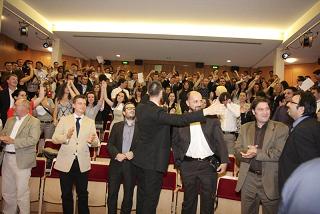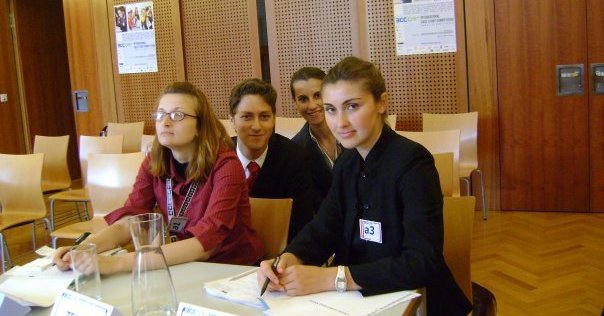The Balkan Case Challenge The Balkan Case Challenge (BCC) is a case student competition and recruitment event for excellent students from South-Eastern Europe and Austria. It aims at strengthening the links between higher education and economy with a special focus on student recruitment and the employability aspect. Every year around 140 students from twelve countries meet and compete in four disciplines: Business Case Competition, Law Moot Court, ICT (Information Communication Technologies) Case Competition and Model European Council.
Education – key to the future of the Balkans. The principle which lies at the core of BCC is that better education is crucial for the faster development of and the long-term convergence prospects for the SEE region. The higher education in the Balkans is characterized by badly outdated teaching materials and methods as well as academic programs which have little or no relevance to the demands of the emerging economies of the region. In the knowledge-based economies of the globalised world the inadequate quality of higher education is certain to inhibit labor productivity and economic growth. To address these issues the Balkan Case Challenge employs the case study method – a tool developed at Harvard University as a practice-oriented method of learning. Students are faced with real-life or fictitious case and have to produce solutions for a concrete problem in their respective field. Therefore, the introduction of the case study method allow the application of theoretical knowledge and bridge the gap between theory and practice.
BCC – it’s more than simply a competition. It is a challenge – to face the best of the best.
Another important feature of BCC is that students compete in mixed teams. That said, the girl from Bosnia has to cooperate with the boy from Serbia in order to achieve success. The ‘team-work approach’ underlying the whole competition is probably the most successful idea of BCC as it reconfigures nationality-based camp antagonisms into a fertile partnership between neighbours.
“It was then, I was 22 years old, that I understood that the knowledge and skills acquired through education were the most important and the most intimate “thing” that I owned” – Almir Kovacevic, Executive Director of WUS Austria
Enhanced Career Opportunities. An important aspect of BCC is the annual Career Day South-Eastern Europe which is organized especially for the participants in the competition. Here the students can find their future job while Austrian and international companies with focus on South-Eastern Europe have the opportunity to get in contact with potential employees. As Halatek-Zbierzchowski from Contrast Management-Consulting explains: “The BCC graduates make up an appealing recruitment pool for many large firms which are active in South-Eastern Europe. The companies that are expanding into the region gain an entrance to an otherwise distant job market.”
Towards a new image for the Balkans. One of the aims of BCC is to promote for the many positive connotations which are linked to the notion “Balkan”. The Balkans, once famously dubbed the Powder keg of Europe, whose towns and villages still bear the scars of war and unspeakable atrocities, is no more sending (only) negative, fear-evoking messages. Instead, the region has more often been called “New Europe”, a term which implies the notion of untapped potential and rich opportunities that wait to be seized. And true, even amidst the woes of the financial crisis, the economic prospects before SEE countries are relatively bright.
The competition also successfully defies some of the most enduring stereotypes about the mindset and character of the Balkan peoples, among them their bellicosity and reluctance to cooperate. During my stay here I met the new generation of young people from the Balkans: devoid of the illusions of communism and fanatic nationalism, well educated and ambitious but also friendly and tolerant, knowing several foreign languages, mobile and cosmopolitan - true citizens of Europe and the world.
“The competition also provided an opportunity to get to know each other and to socialize across national and ethnic lines thus developing a sense for the beauty of diversity, which is so important in the process of integration into the European Union.” – Wolfgang Benedek, Chairman of WUS Austria
BCC – more than a competition. After two full days of contested battles on the fields of law, politics, business and informatics it was time to get to know each other better. Then I realized the truth about BCC – it’s more than simply a competition. It is a challenge – to face the best of the best. It is a lot of joy - to be among such vibrant and enthusiastic young people bursting with energy and intellect. It is a pleasure - to delight in a short walk or a nice conversation with any of them. It is also shared memories and shared experience. In the end, what remain are not the prizes but the new found friendships. And I know that whenever I come to Vienna or Bucharest, Skopje or Pristina I will not be alone because there will be my dear BCC friends.

And as in every competition there was an awarding ceremony. Festive atmosphere enveloped the hall where the winners took their prizes greeted with loud applause. The event reached its climax when Boris Marte, the managing director of ERSTE Stiftung, deeply moved the audience with an inspirational speech accompanied by the song “Heal the world”, a tribute to the legendary Michael Jackson. The message was simple but powerful: go back to your countries and make them a better place to live.
After several sleepless nights, an exciting competition and a lot of fun the BCC was over and we all left the beautiful city of Vienna with the bitter-sweet taste of having had a once-in-a-lifetime experience that we will never forget. It’s been more than two weeks since the competition ended but we are still filled with nostalgia for those wonderful days.
In 2010 the Balkan Case Challenge will turn 10 years. I believe that during that period BCC has achieved a lot by investing time, money and knowledge to develop the high potential of the young people which one day will decide the fortunes of their countries and will help to build stable, peaceful and prosperous Balkans. Anniversaries always bring something special to events and I’m looking forward to seeing you in Vienna for one memorable and exciting week!
To learn more about the competition and how to apply for participation visit www.bcchallenge.org.


Follow the comments: |
|
